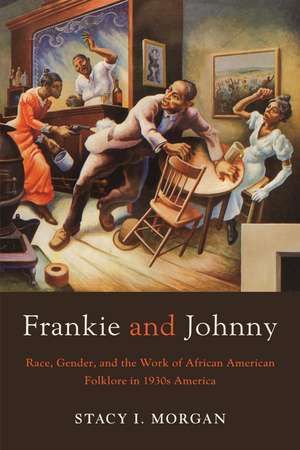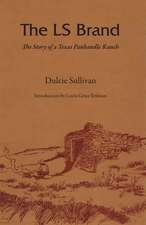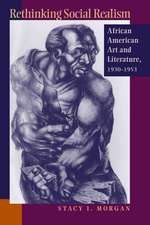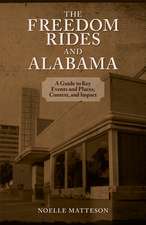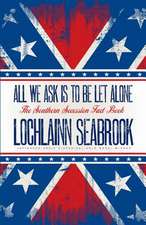Frankie and Johnny: Race, Gender, and the Work of African American Folklore in 1930s America
Autor Stacy I. Morganen Limba Engleză Hardback – 18 apr 2017
Originating in a homicide in St. Louis in 1899, the ballad of “Frankie and Johnny” became one of America’s most familiar songs during the first half of the twentieth century. It crossed lines of race, class, and artistic genres, taking form in such varied expressions as a folk song performed by Huddie Ledbetter (Lead Belly); a ballet choreographed by Ruth Page and Bentley Stone under New Deal sponsorship; a mural in the Missouri State Capitol by Thomas Hart Benton; a play by John Huston; a motion picture, She Done Him Wrong, that made Mae West a national celebrity; and an anti-lynching poem by Sterling Brown.
In this innovative book, Stacy I. Morgan explores why African American folklore—and “Frankie and Johnny” in particular—became prized source material for artists of diverse political and aesthetic sensibilities. He looks at a confluence of factors, including the Harlem Renaissance, the Great Depression, and resurgent nationalism, that led those creators to engage with this ubiquitous song. Morgan’s research uncovers the wide range of work that artists called upon African American folklore to perform in the 1930s, as it alternately reinforced and challenged norms of race, gender, and appropriate subjects for artistic expression. He demonstrates that the folklorists and creative artists of that generation forged a new national culture in which African American folk songs featured centrally not only in folk and popular culture but in the fine arts as well.
Preț: 530.22 lei
Preț vechi: 688.59 lei
-23% Nou
Puncte Express: 795
Preț estimativ în valută:
101.47€ • 105.29$ • 84.81£
101.47€ • 105.29$ • 84.81£
Carte tipărită la comandă
Livrare economică 18 martie-01 aprilie
Preluare comenzi: 021 569.72.76
Specificații
ISBN-13: 9781477312070
ISBN-10: 1477312072
Pagini: 272
Dimensiuni: 152 x 229 x 24 mm
Greutate: 0.45 kg
Editura: University of Texas Press
Colecția University of Texas Press
ISBN-10: 1477312072
Pagini: 272
Dimensiuni: 152 x 229 x 24 mm
Greutate: 0.45 kg
Editura: University of Texas Press
Colecția University of Texas Press
Notă biografică
Stacy I. Morgan is an associate professor of American studies at the University of Alabama. He is the author of Rethinking Social Realism: African American Art and Literature, 1930–1953.
Cuprins
- Acknowledgments
- Chapter 1. Frankie and Johnny Take Center Stage: African American Folk Culture in 1930s America
- Chapter 2. Lead Belly's Ninth Symphony: Huddie Ledbetter and the Changing Contours of American Folk Music
- Chapter 3. Pistol Packin' Mama: Imperiled Masculinity in Thomas Hart Benton's A Social History of the State of Missouri
- Chapter 4. Whiteface Marionettes: John Huston's Comic Melodrama
- Chapter 5. The Finest Woman Ever to Walk the Streets: Mae West's Outlaw Exploits in She Done Him Wrong
- Chapter 6. The Lynching of Johnny: Sterling Brown's Social Realist Critique
- Epilogue. African American Women's Voices and the Tightrope of Respectability
- Notes
- Index
Recenzii
Morgan's brilliant examination of race and gender in creative appropriations of the 'Frankie and Johnny' ballad furthers the discourse on how African American folk culture contributed to the unique characteristics of American modernism during the 1930s.
A well-researched analysis of the complex intersections between African American culture and folklore and mainstream popular music and film culture of the 1930s.
[A] masterpiece...Frankie and Johnny showcases the talents of performers, entertainers, composers, and artists while simultaneously telegraphing the tormented rawness of unrequited fidelity...Morgan’s tireless, copious research yields rich rewards, allowing the reader an emotionally vicarious experience of a 'somebody done somebody wrong' theme.
Descriere
With chapters on Lead Belly, Thomas Hart Benton, John Huston, Mae West, and Sterling Brown, this innovative book presents a new argument for the centrality of African American folklore as a source of cultural expression in the 1930s.
